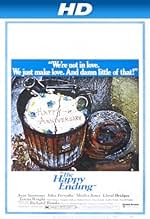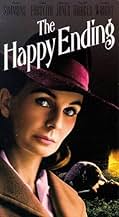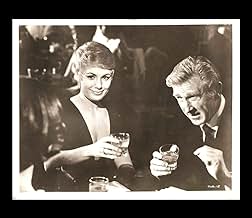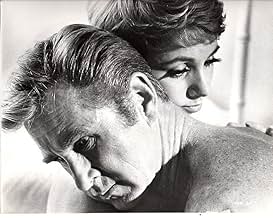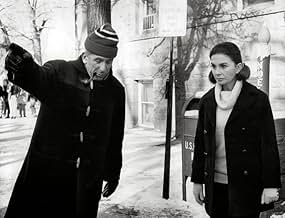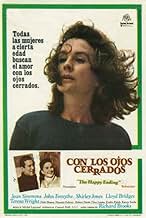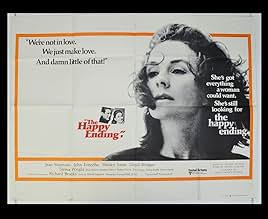CALIFICACIÓN DE IMDb
6.3/10
1.3 k
TU CALIFICACIÓN
Agrega una trama en tu idiomaA middle-aged woman walks out on her husband and family in an desperate attempt to find herself.A middle-aged woman walks out on her husband and family in an desperate attempt to find herself.A middle-aged woman walks out on her husband and family in an desperate attempt to find herself.
- Dirección
- Guionista
- Elenco
- Nominado a 2 premios Óscar
- 5 nominaciones en total
Bobby Darin
- Franco
- (as Robert Darin)
William O'Connell
- Minister
- (as Wm. O'Connell)
Ingrid Bergman
- Self - Actress in 'Casablanca'
- (material de archivo)
- (sin créditos)
Humphrey Bogart
- Self - actor in 'Casablanca'
- (material de archivo)
- (sin créditos)
- Dirección
- Guionista
- Todo el elenco y el equipo
- Producción, taquilla y más en IMDbPro
Opiniones destacadas
Pauline Kael, film critic for the New Yorker, quipped about this film, "It's the kind of liberation movie that never liberated anyone." That's a clever line, but it isn't exactly true. Writer-director Richard Brooks shows the upwardly mobile as stiff dullards with drinks in their hands, the upper middle class as stifling bores. There's wry wit in these vignettes, but the trouble with Brooks' film is the central character. As played by Jean Simmons, she's one of those bored and lonely housewives who desires MORE! Simmons is repressed of her emotions, yet even when she makes her escape, she's still a pinchy drag. The supporting characters aren't written any better, but the performers themselves are more interesting: Bobby Darin is terrific as a phony gigolo, Tina Louise excellent as an acerbic society wife, Shirley Jones lovely as a single woman trying to remain casual about her married lover. John Forsythe gives his standard controlled performance as Simmons' confused spouse (he doesn't know how to reach her, which is a sympathetic quality since we don't either). The title means to tell us that we make our own happy endings--that we can't find them through other people--and the final scene between husband and wife is a tricky little chess-move that leaves us up in the air. I liked many things in "The Happy Ending", but its parts are better than the sum. **1/2 from ****
This is a serious work about a bored wife. Some of it seems a little dated. Seen in 1999, the development of the story is quite predictable, although I figure it was less so 30 years ago. Didn't move me much. All in all, respectable stuff.
When I first saw THE HAPPY ENDING, back in 1970, I was blown over by the film's sensitive portrayal of an unhappy housewife trying to decide what to do with her life. I took family and friends to see it and most people liked the film, finding it unusually frank as a portrayal of a failed marriage. I still find THE HAPPY ENDING very good. It is aesthetically rooted in the late sixties but that does not diminish its essential value. The all-star cast is excellent (Jean Simmons, John Forsythe, Teresa Wright, Nanette Fabray, Shirley Jones, Bobby Darin, Lloyd Bridges, Tina Louise) and Jean Simmons might have shared the Oscar with Maggie Smith that year. Both actresses deserved to receive acting honors for their respective roles. I love the jazzy music score by Michel Legrand; Marilyn & Alan Bergman's beautiful song-theme for the film is a perennial favorite of mine as far as romantic songs are concerned. All in all, I will always have a special place in my heart for THE HAPPY ENDING.
I love movies that come down hard against conventional life. And the ones that feature nagging, chronically unhappy, never-satisfied married people go in my "horror" stack, along with Halloween, Videodrome, Suspiria, The Fog, etc. Watching that way of life is enough to fill anyone with ineffable dread.
When you consider that lead actress Jean Simmons and director Richard Brooks (married 1960-1977) were on their way to divorce, that just adds to the terror.
Though it echoes themes in Charlotte Perkins Gilman's The Yellow Wallpaper (1899), The Happy Ending is still seen as a proto-feminist text, which it well may be. I've long held that Jean Simmons (or at least the "Jean Simmons image") is not this quiet, polite, understated "demure beauty" that is somehow constantly breaking out of that particular mold. Ms. Simmons herself can be seen as a "proto-feminist" or strong female lead actress. She demonstrates this in Hamlet, Desiree, Young Bess, The Big Country, and certainly Elmer Gantry; one could actually make this case for many of her films available on video.
Her part in The Happy Ending is really just an expansion of these roles, only this time, the unhappy marriage is brought to the fore instead of subsumed in Hollywood/Happy ending resolve.
It's not just proto-feminist women who feel trapped by marriage; that men get cold feet and then have affairs is almost too cliché to mention or bother to put in quotes. How many movies about extramarital affairs have entertained millions? This film just happens to present the unthinkable horror of when a woman wants out of it. Good for them. 8/10, but be advised, this is coming from someone unable to resist movies about women who don't want to be married.
To this end, see it as a double feature with Baby Doll (1956), or Possession (1981), mess up your mind, a little.
When you consider that lead actress Jean Simmons and director Richard Brooks (married 1960-1977) were on their way to divorce, that just adds to the terror.
Though it echoes themes in Charlotte Perkins Gilman's The Yellow Wallpaper (1899), The Happy Ending is still seen as a proto-feminist text, which it well may be. I've long held that Jean Simmons (or at least the "Jean Simmons image") is not this quiet, polite, understated "demure beauty" that is somehow constantly breaking out of that particular mold. Ms. Simmons herself can be seen as a "proto-feminist" or strong female lead actress. She demonstrates this in Hamlet, Desiree, Young Bess, The Big Country, and certainly Elmer Gantry; one could actually make this case for many of her films available on video.
Her part in The Happy Ending is really just an expansion of these roles, only this time, the unhappy marriage is brought to the fore instead of subsumed in Hollywood/Happy ending resolve.
It's not just proto-feminist women who feel trapped by marriage; that men get cold feet and then have affairs is almost too cliché to mention or bother to put in quotes. How many movies about extramarital affairs have entertained millions? This film just happens to present the unthinkable horror of when a woman wants out of it. Good for them. 8/10, but be advised, this is coming from someone unable to resist movies about women who don't want to be married.
To this end, see it as a double feature with Baby Doll (1956), or Possession (1981), mess up your mind, a little.
--this film is for you, as you'll hear that song constantly throughout the film.
"The Happy Ending" stars Jean Simmons, John Forsythe, Teresa Wright, Shirley Jones, Nanetete Fabray and Lloyd Bridges, and is directed by Simmons' husband, Richard Brooks. Interestingly, Teresa Wright didn't like his directing and found it pedantic, adding, "but I can't say anything because of Jean." Jean Simmons is one of my favorite actresses and this story serves her well. After twenty years, the lust is gone from Mary Wilson's marriage to husband Fred (Forsythe); she drinks, she pops pills, and finally, after a huge spending spree, her husband takes her credit cards and charge accounts away from her. Her favorite thing is watching old movies which have happy endings; strangely, one of her favorites is Casablanca. Casablanca has a noble ending, even a satisfactory ending. But a happy ending? I mean, Bogie ends up with Louis.
Finally, Mary manages to get her hands on some money, and she takes off for the Bahamas, where she is taken in by an old school friend (Shirley Jones), the "other woman" in several relationships who now finds herself involved with Lloyd Bridges, looking pretty darn good, I might add.
The film seems to be a series of flashbacks and music videos; it is surprising how little dialogue there actually is. Jean Simmons at 40 is radiantly beautiful as usual and she does a great job as Mary. Simmons was a totally underrated actress, squeezed in as she was with the likes of Audrey Hepburn and Elizabeth Taylor. Brooks again has cast Shirley Jones as a bad girl, and again, she's effective. Teresa Wright plays Mary's mother, who can't quite understand her daughter's quest for happiness. Mary wants the fairytale.
I found this film just okay, at times confusing because of the seamlessness of the flashbacks, and frankly, I got sick of hearing "What are you doing...", a song a young man once sang to me and informed me that he had written it. Right.
Anything with Simmons is worth seeing, but at times, this one is tough going.
"The Happy Ending" stars Jean Simmons, John Forsythe, Teresa Wright, Shirley Jones, Nanetete Fabray and Lloyd Bridges, and is directed by Simmons' husband, Richard Brooks. Interestingly, Teresa Wright didn't like his directing and found it pedantic, adding, "but I can't say anything because of Jean." Jean Simmons is one of my favorite actresses and this story serves her well. After twenty years, the lust is gone from Mary Wilson's marriage to husband Fred (Forsythe); she drinks, she pops pills, and finally, after a huge spending spree, her husband takes her credit cards and charge accounts away from her. Her favorite thing is watching old movies which have happy endings; strangely, one of her favorites is Casablanca. Casablanca has a noble ending, even a satisfactory ending. But a happy ending? I mean, Bogie ends up with Louis.
Finally, Mary manages to get her hands on some money, and she takes off for the Bahamas, where she is taken in by an old school friend (Shirley Jones), the "other woman" in several relationships who now finds herself involved with Lloyd Bridges, looking pretty darn good, I might add.
The film seems to be a series of flashbacks and music videos; it is surprising how little dialogue there actually is. Jean Simmons at 40 is radiantly beautiful as usual and she does a great job as Mary. Simmons was a totally underrated actress, squeezed in as she was with the likes of Audrey Hepburn and Elizabeth Taylor. Brooks again has cast Shirley Jones as a bad girl, and again, she's effective. Teresa Wright plays Mary's mother, who can't quite understand her daughter's quest for happiness. Mary wants the fairytale.
I found this film just okay, at times confusing because of the seamlessness of the flashbacks, and frankly, I got sick of hearing "What are you doing...", a song a young man once sang to me and informed me that he had written it. Right.
Anything with Simmons is worth seeing, but at times, this one is tough going.
¿Sabías que…?
- TriviaTeresa Wright was just 11 years older than Jean Simmons, who was playing her daughter.
- ErroresDuring the opening-credit sequence, many late-model 1960's cars are seen in flashback scenes supposedly set 15 years earlier.
- Citas
[last lines]
Mary Wilson: If... if right now we were not married, if you were free, would you marry me again ?
- Versiones alternativasThe film was originally submitted to the MPAA for an R rating. After United Artists found Richard Brooks' intended cut too depressing, the studio forced to cut the film into a "moviegoer friendly" cut that was rated M. Brooks' R-rated cut was released in other countries as intended but was not released in the United States until 2016.
- ConexionesFeatures Susan Lenox (Her Fall and Rise) (1931)
- Bandas sonorasWhat Are You Doing the Rest of Your Life?
Music by Michel Legrand
Lyrics by Alan Bergman and Marilyn Bergman
Sung by Michael Dees
Selecciones populares
Inicia sesión para calificar y agrega a la lista de videos para obtener recomendaciones personalizadas
- How long is The Happy Ending?Con tecnología de Alexa
Detalles
- Tiempo de ejecución1 hora 57 minutos
- Relación de aspecto
- 2.35 : 1
Contribuir a esta página
Sugiere una edición o agrega el contenido que falta

Principales brechas de datos
By what name was El amargo fin (1969) officially released in India in English?
Responda

